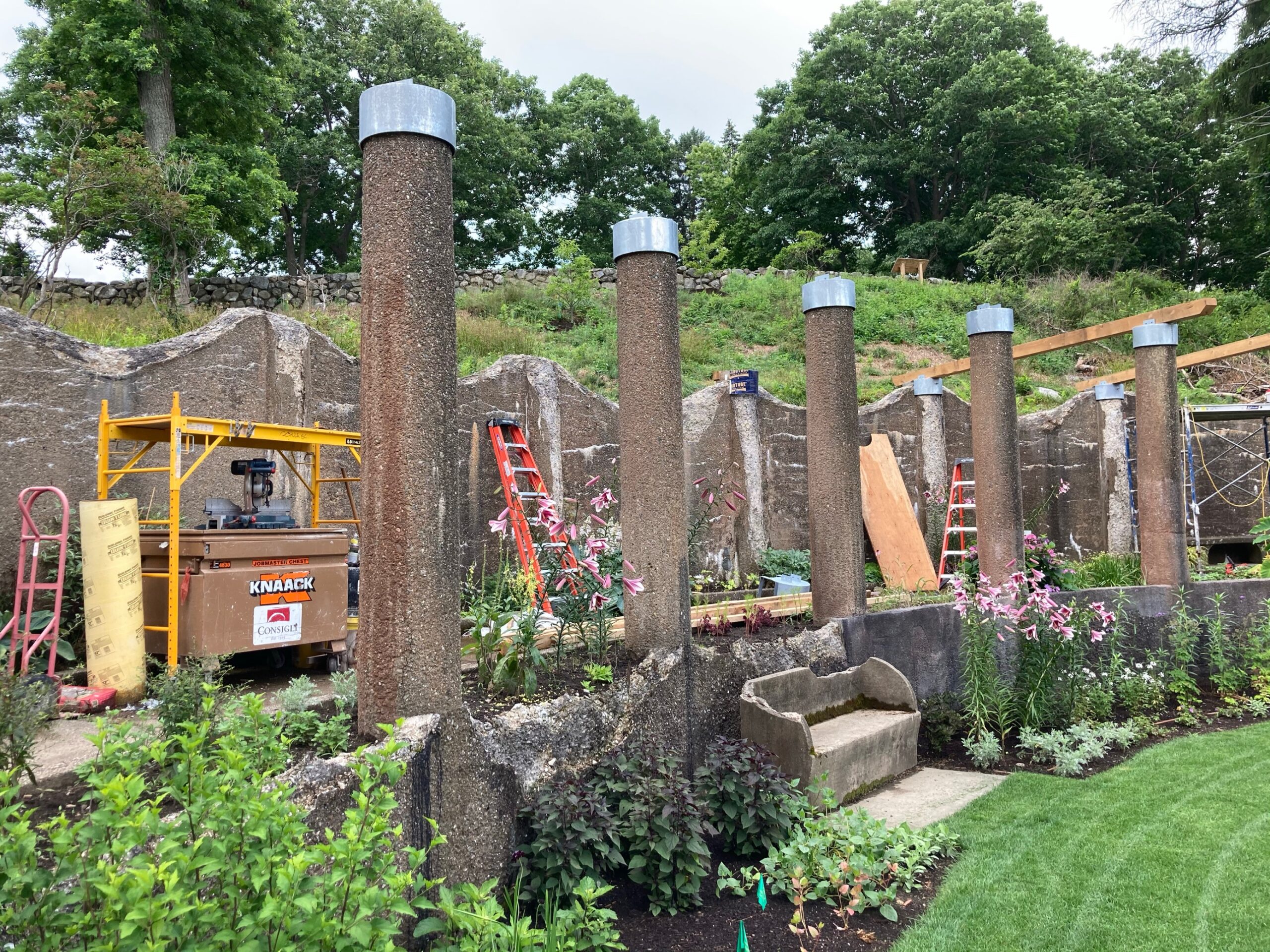A | B | C | D | E | F | G | H | I | J | K | L | M | N | O | P | Q | R | S | T | U | V | W | X | Y | Z
Agricultural preservation restriction (APR):In Massachusetts, an APR is a special type of conservation restriction. Authorized by Chapter 780 of the Acts of 1977, an APR is a legal restriction prohibiting non-agricultural use or development of a parcel in order to preserve the land for agricultural purposes. To date, Massachusetts has authorized approximately $126 million for the purchase of APR’s by the Department of Food and Agriculture. Owners of productive agricultural land may also donate APRs to the Department of Food and Agriculture or to land trusts, subject to approval of the municipality and the Commissioner of Food and Agriculture.
Bargain sale:The sale of land or interest in land to a governmental body or conservation organization at a price less than the fair market value. In other words, a bargain sale is partly a sale and partly a charitable gift. The difference between the fair market value and the bargain sale price is tax-deductible as a charitable contribution.
Capital gain:The “profit” (sales revenues minus cost basis) obtained by the taxpayer from the sale of property. A long-term capital gain or loss results from the sale of property held for more than twelve months.
Charitable gift:A gift of money or property to an IRS-qualified charitable organization. It means the same as “charitable donation” and “charitable contribution,” which is the term used most commonly in the tax world.
Charitable remainder trust:A trust that provides for a specified distribution to one or more beneficiaries, at least one of which is not a charity, for life or for a term of years, with an irrevocable remainder interest to be held for the benefit of, or paid over to, charity.
Conservation buyer:Generally an individual of means who will purchase land at full price (or close to full price) and then place a conservation restriction on the land or a major portion of the land, thus ensuring its permanent conservation.
Conservation restriction (or conservation easement):A legal agreement between a landowner and a conservation organization that permanently or for a stated period limits specified uses and development of the property to protect its natural and scenic features. The document conveys to the conservation organization the right to monitor the property and enforce the terms of the agreement. The provisions of conservation restrictions will vary from situation to situation, depending upon the desires and goals of the grantor and grantee. Usually, the restriction forever prohibits development of the land on which a Conservation Restriction (CR) has been granted or placed. However, some uses of the property, such as farming or timber harvesting, are frequently permitted where they are consistent with the objectives of the parties. The conservation restriction should make clear which uses of the property are permitted, and which are prohibited. It is recorded like a deed and is binding upon future owners of the property. Learn more about Conservation Restrictions.
Cost basis:The cost of the property at its time of acquisition, or value when inherited, plus the cost of certain permanent capital improvements. The cost basis is deducted from the sale price to determine capital gain. Note that with bargain sales or donations of restrictions, the cost basis must be allocated between the different portions of the transaction for tax purposes.
Deed restrictions:Restrictive covenants placed within a deed that guide the future use of a property. Usually placed on a portion of a property that is sold to protect the integrity of the parcel that is retained, these are less permanent than conservation restrictions as they may be released upon agreement of future owners of the parcels. The IRS does not allow deduction of their value as a charitable donation.
Development rights:The owner’s legal right to develop the property, subject to law and regulation. An owner of land holds a bundle of various rights, including the right to develop the land. When a person conveys his “development rights” to a land trust, for example, he gives up his right (and the right of his heirs and successors) to develop the land. At the same time, the land trust or other recipient itself does not obtain the right to develop the property. Technically, the land trust obtains only the legal right to prevent future development of the property. (See also conservation restriction and fee simple.)
Easement:A right of one owner of land to make some particular use of the land of another owner, as created by express or implied agreement between the owners. A right-of-way is a common example.
Endowment:A capital fund invested to provide annual interest to support a charitable purpose. Typically, a land trust’s endowment funds are merged for management and investment purposes, but each component should be recorded and reported in separate fund accounts. A responsible organization will observe a firm policy capping the amount of income that is withdrawn each year so that the endowment continues to grow. Some endowments allow for withdrawals of principal for stated purposes, others do not. It is important for an organization and donor to discuss the terms of a proposed endowment and agree on a clear statement for their records.
Fair market value:The appraiser’s definition is “the price at which a willing buyer would purchase a property and a willing seller would sell the same property, when neither party is under any compulsion to buy or sell, and each party has full knowledge of all pertinent facts relating to the sale.” Professional appraisers use several different methods for estimating fair market value depending on the type of property involved.
Fee:An ownership interest in real estate. “Fee” derives from the medieval word “feodor” meaning land. Ownership of property “in fee” means that the property may be conveyed by sale, gift, or bequest.
Fee simple:An ownership interest in real estate that is perpetual and without conditions, limitations, or restrictions. To own land “in fee simple” means to have complete ownership of the land, with all the usual rights associated with ownership.
Grantor/Grantee:The person conveying property to another is the grantor. The recipient is the grantee.
Historic preservation restriction:Authorized by the same Massachusetts law as conservation restrictions (Sections 31–33 of Chapter 184), it prohibits the alteration of historic features without the grantee’s approval. Often known as a “facade easement,” when limited to exterior features, though it may protect land areas as well as historic structures.
Installment sale:A contract by which goods are purchased now, but paid for over a period of time by a number of installments.
IRS Determination Letter:A letter from the Internal Revenue Service to a newly qualified 501(c)(3) organization which certifies that the organization is exempt from tax under Section 501(c)(3) and specifies whether the organization is considered to be a public charity, a private foundation or a private operating foundation.
Land trust:A nonprofit organization that assists landowners who wish to voluntarily conserve their properties. Land trusts are usually organized as charitable corporations, not as trusts.
License:In regards to property, it is a personal privilege or permission with respect to some use of land that is revocable at the will of the landowner.
Limited development:Less than maximum development of a parcel for the purpose of enabling conservation of remaining portions of the parcel.
Mutual covenants:Written commitments exchanged among neighboring landowners in deeds or separate agreement.
Option to purchase:A right, for a stated period of time, to acquire a specific property at a specific price.
Partial interest:An interest in land that is less than full fee ownership. (See also fee and fee simple.)
Post mortem election:The ability of a member of the decedent’s family, the executor of the estate, or the trustee of a trust of the corpus to place a conservation restriction upon land in an estate after the landowner’s death but before the federal estate tax is filed.
Private foundation:A 501(c)(3) organization controlled by relatively small groups of people or single families. Their activities are often limited to making grants to other 501(c)(3) organizations. The tax advantages of making lifetime gifts to private foundations are more limited than for gifts to public charities or private operating foundations.
Private operating foundations:These 501(c)(3) organizations are usually controlled by small groups of people, rather than a broad membership; but they are actively engaged in directly carrying out educational or other charitable endeavors rather than simply making grants to other organizations.
Publicly supported charities (or public charities):Nonprofit 501(c)(3) organizations that are engaged in educational, religious, scientific or charitable activities. A major part of their support comes from a broad membership base, governmental entities and other public charities. Within the limitations described in this booklet, a donor may take full advantage of tax deductions for contributions to public charities.
Remainder interest:If a donor conveys an asset to a charitable or governmental organization, but retains the right (for herself or some other person or persons) to live on or use the land for her lifetime or a stated number of years, the interest that is being conveyed is called the “remainder interest.” The interest being retained can be a “life interest” or a possessory interest for a term of years. (See also reserved life estate.)
Reserved life estate:In some cases, a landowner will make a gift of his property, but reserves the right to live on or use that property until death or for a lesser term of years. Where the donee is a governmental body or charitable organization, and where the gift is a personal residence or farm, or other property given for conservation purposes, the landowner may take a charitable deduction for the present value of the gift.
Revolving fund:A fund that provides interim financing for conservation projects when time is a critical factor. A land trust can borrow from the fund to acquire a property or restriction on a property; however, the loan must be repaid, often with interest, once a fundraising effort has been conducted.
Right of first refusal:Agreement by an owner to offer a property to a specified individual or organization at the same price and terms as those in a future bona fide offer to purchase received by the owner. In other words, the individual or organization has the right to match the future offer, subject to certain conditions.
Scenic easement:A legal agreement that prohibits construction or development that would detract from a property’s scenic quality as described in the easement document. In Massachusetts a scenic easement is simply a specially tailored conservation restriction and must satisfy the same procedures and legal requirements as other similar restrictions.
Subordinate:(v) To yield one’s priority interest or senior interest in a property and to agree to become junior (or subordinate) to another party’s interest.
Title:A deed or other legal evidence of one’s ownership of land, usually in a document recorded in the Registry of Deeds.
Undivided interest:A percentage of the full fee interest in an entire property. Undivided interests are shared jointly with one or more other parties, known or unknown. The majority owner does not necessarily control the property. Any holder of undivided interests has the right to seek a court-ordered partition of the property.
Watershed preservation restrictions:A special type of conservation restriction recognized by Massachusetts law that gives the holder the right to retain land in such condition so as to protect the water supply or potential water supply of the Commonwealth by prohibiting building construction and placement and surface alterations such as mining or excavation of materials.




